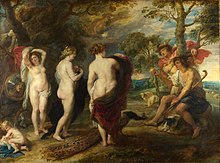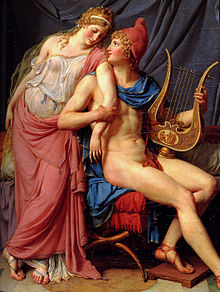Paris (mythology)

Paris [ ˈpaːrɪs ] (Greek Πάρις) is the son of the Trojan king Priam and Hecabe in Greek mythology . He is thus the brother of Hector and Kassandra . In total, he has more than 50 siblings and half-siblings. By kidnapping Helena , he starts the Trojan War .
He has been called Alexandros since Homer , which was supposed to explain the quality associated with the name Paris to a Greek audience. The Greek Alexandros means "the man defending himself" and is his common name in the inscriptions of Greek vase painting . Hyginus calls him Alexander Paris . It is possible that the variant of Alexandros can be connected with King Alaksandu of Wilusa , who was mentioned in a Hittite document ( CTH 76, so-called Alaksandu Treaty) from the early 13th century BC. Occurs.
myth
The birth of Paris and his life with the shepherds
Before Paris is born, Hecabe dreams that she will give birth to a torch that Troy will set alight. After she has told Priam about the dream, the latter lets Aisakos come to, who has the ability to interpret dreams. Aisakos says that Hecabe will bear a son who will bring about the ruin of Troy. Startled by this prophecy , Priam and Hecabe decide to abandon the newborn. The job is given to Agelaos , a slave of the king. He abandons the child on Mount Ida ; after a while, however, he returns ruefully. To his astonishment, he finds the child alive and well: a she-bear has suckled it. Agelaos calls the boy Paris and raises him in the fields and with the shepherds. Paris grows up as a shepherd. When he reached the age of man he married the nymph Oinone , a daughter of the river god Kebren .
The judgment of Paris
One day Hermes appears to him , who asks him to choose which of the three goddesses Hera , Athena and Aphrodite is the most beautiful, whereupon they try to bribe him. Paris reaches his verdict : after Hera has promised him power and Athene promises fame, he chooses Aphrodite, who has promised him the hand of the most beautiful woman on earth, Helena, the wife of Menelaus , King of Sparta . The other two goddesses are disappointed, Hera swears eternal enmity to Paris and the Trojans. Their hatred contributed to the downfall of Troy and followed the Trojan Aeneas on his wanderings. (See Virgil's Aeneid )
Funeral games in Troy and recognition of Paris
In Troy, Hecabe is still mourning the prodigal son. In her grief she turns to Priam; he promises to hold funeral games in honor of the prodigal prince. A particularly powerful bull from the king's herds on Mount Ida will be offered as a prize. However, this bull is Paris's favorite animal, so the latter decides to take part in the games in Troy to win the bull himself.
Indeed, Paris, who continues to consider himself a simple shepherd and is taken by others to win against his brothers and the strongest young Trojans, succeeds. Paris' brother Deiphobos, however, does not want to accept his defeat by a shepherd and would like to cut his throat. Fearing Deiphobus, Paris flees to the altar of Zeus. There his sister Kassandra sees him , who has been endowed with the ability of divination by Apollo , and recognizes in him the brother who has long been believed to be dead. When the parents hear that the man who had been believed to have been lost has reappeared, they take him into the royal palace, forgetting the prophecy that Paris will be the torch of Troy. Kassandra tries in vain to remind her of this; because Apollo also put the curse on them that no one takes their prophecies seriously.
Exit to Greece
Priam's sister Hesione was stolen from Priam long ago by the Greeks . Aphrodite suggests to Paris to propose to the Trojans council to send an embassy to Sparta in Greece , which Hesione should first peacefully request back, but if necessary bring it back by military force. On this occasion Paris reports on his judgment and that he is now under Aphrodite's protection. Priam trusts Aphrodite's help and agrees to the plan. Paris and Hector also belong to the embassy.
In Sparta, however, Paris meets Helena, whom Aphrodite had promised him as his wife. Paris kidnaps her, which is not difficult, because she has fallen in love with him, and thus, without wanting to, triggers the Trojan War . From an ethnological point of view, it was about bride robbery , as it was practiced in many societies and de facto tolerated and is played out in wedding customs to this day. In another version of the saga, it is of course only an image that leads Paris home, while the real Helena remains in Sparta.
War successes

Paris did not achieve great fame on the battlefield. He is a good archer, but fails in hand to hand combat. B. in his duel with Menelaus, the husband of Helena and King of Sparta, in which he is almost strangled by Menelaus with his own helmet strap, until Aphrodite interferes and takes him to safety with the help of a cloud.
It is not worked out directly in the Iliad, since the central heroes are different (Hector, Achilles, Ajax, Diomedes), but Paris is also a good fighter. His subject area and his typification is different from that of the other heroes, but he is and remains a hero and is therefore still superior to the "normal mortals" in terms of fighting power.
Hector even praises him: "You fool, a man who is cheap could hardly blame what you accomplish in battle, because you are brave and defensive." He then rebukes him for being too unwilling to fight and says that it saddened him when the Trojans spoke condescendingly of Paris. This speech is followed by a short aristia by Hector and Paris, that is, a phase in which they very quickly kill some Greeks. This short phase of unhindered victory is less elaborate than other aristias, contains fewer details and not a single speech, and is abruptly ended by the gods. Paris is only briefly introduced as a brave hero and can hardly boast of its deeds as much as the other heroes. This is the portrayal of Paris' battle performance in the Iliad.
Outside of the Iliad, however, he succeeds in killing the dreaded Achilles , who is considered invulnerable down to his heel . Paris accomplishes this with the bow, although Apollo guides him by the hand.
Paris' unfortunate fate
The Greek archer Philoctetes possesses the bow and arrows of Heracles , which are poisoned with the deadly poison of the Lernaean serpent . With two of these arrows he wounds Paris. Suffering, he drags himself to Oinone , his first wife, on Mount Ida and asks her to save him with an antidote that she possesses. Out of anger that he once left her for Helenas, she refuses to give him any help. Paris succumbs to his injury in agony. But Oinone is overcome with remorse for not helping him; she builds a funeral pyre and jumps into the flames to join the beloved dead. Helena falls as wife to his next younger brother, Deiphobos .
swell
Far from everything that is discussed above is in the Iliad . For the most part, the material goes back to the Kypria outside of the battle before Troy , but of course Homer shaped the figure for us, especially the ambivalence between the sometimes capable fighter and the then again effeminate handsome. Some traits, such as the Eris apple, apparently emerged later, when Greek tragedy, and especially Greek comedy , began to study history intensively. Vase painting also had a strong influence .
- Alberto Bernabé Pajares (Ed.): Poetarum epicorum Graecorum testimonia et fragmenta , Vol. 1, Teubner, Leipzig 1987. (Bibliotheca scriptorum Graecorum et Romanorum Teubneriana), ISBN 3-322-00352-3 .
- Malcolm Davies (Ed.): Epicorum Graecorum fragmenta , Vandenhoeck & Ruprecht, Göttingen 1988. ISBN 3-525-25747-3
- Martin L. West (Ed.): Greek epic fragments from the 7th to the 5th centuries BC , ed. And transl. Harvard Univ. Press, Cambridge, Mass., 2003. (The Loeb classical library 497), ISBN 0-674-99605-4
literature
- Inge El-Himoud-Sperlich: The judgment of Paris. Studies on the pictorial tradition of the subject in the 16th century. Dissertation, University of Munich 1978 ( DNB 790958953 ).
- Roland Hampe : Alexandros . In: Lexicon Iconographicum Mythologiae Classicae (LIMC). Volume I, Zurich / Munich 1981, pp. 494-529.
- Steffen Schneider: Paris. In: Maria Moog-Grünewald (Ed.): Mythenrezeption. The ancient mythology in literature, music and art from the beginnings to the present (= Der Neue Pauly . Supplements. Volume 5). Metzler, Stuttgart / Weimar 2008, ISBN 978-3-476-02032-1 , pp. 551-556.
- Magdalene Stoevesandt: Paris. In: The New Pauly (DNP). Volume 9, Metzler, Stuttgart 2000, ISBN 3-476-01479-7 , Sp. 334-336.
- Gustav Türk : Paris . In: Wilhelm Heinrich Roscher (Hrsg.): Detailed lexicon of Greek and Roman mythology . Volume 3.1, Leipzig 1902, Sp. 1580-1638 ( digitized version ).
Web links
Individual evidence
- ↑ Homer , Iliad 24, 493-498; Library of Apollodorus 3, 12, 6-9; Hyginus, Fabulae 90
- ↑ Homer, Iliad 3:16
- ^ Hyginus, Fabulae 91 and 92
- ↑ Alexander Demandt: Ancient forms of government. A Comparative Constitutional History of the Old World. Akademie-Verlag, Berlin 1995, ISBN 3-05-002794-0 , p. 267.


